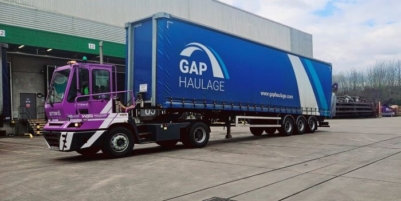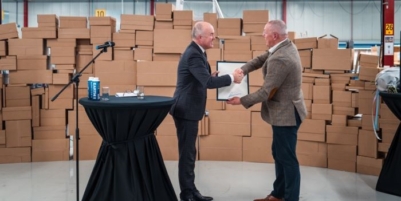-
Nutrivend selects Forterro’s Orderwise to support online expansion and streamline operations - April 11, 2025
-
ARROWXL LAUNCHES AMBITIOUS ZERO WASTE ROADMAP - April 8, 2025
-
THE BCMPA’S NEW CAMPAIGN DRIVES OUTSOURCING SUCCESS IN Q1 - April 7, 2025
-
BLACKOUT TECHNOLOGIES TARGETS TELEMATICS-INTEGRATED MOBILE DEVICE BLOCKING TO COMBAT SMARTPHONE DISTRACTION - April 1, 2025
-
Sparck Technologies awarded Royal designation - March 27, 2025
-
OpenADR Alliance announces first OpenADR 3.0 certified products with EVoke Systems, E.ON Energy and Universal Devices - March 25, 2025
-
Growing fulfilment and contract packer appoints new Managing Director - March 25, 2025
-
When is it time to invest in a WMS? Understanding the key trigger points - March 25, 2025
-
eCapital helps Vantage Recruitment on its journey to financial success - March 24, 2025
-
Hugo Beck Celebrates 70 Years of Packaging Innovation with Open House Events - March 20, 2025
Supply chain mapping vital to minimise impact
Resilinc, the world’s leading supply chain mapping and risk monitoring solution, is warning UK businesses to strengthen their supply chains in the face of potential disruption from China.
Resilinc, which uses the data from its EventWatchAI monitoring system to identify ongoing threats to the global supply chain, predicts that any halt in production in China for more than two to three weeks will cause a ripple-effect across the globe, the impact of which could be felt for months.
Bindiya Vakil, founder and CEO, Resilinc explains; “While there has been some stockpiling by companies in anticipation of further disruption, the relaxation of China’s zero-tolerance Covid policy means that many manufacturers will face labour shortages and ‘self-imposed’ lockdowns as a result of sickness. At the moment the spotlight is on large companies such as Apple and now Dell, who just last week announced it is phasing out the production of chips in China.
“However, the situation in China and the impact on supply chains should not just be the concern of ‘big business’. The very nature of supply chains being intrinsically linked across the globe and involving organisations of every size from the small to substantial, means that businesses of all sizes need to take action now to strengthen and diversify their supply chains.”
Bindiya (Vakil) recommends that UK businesses start by mapping their supply chain to get a clear handle on the whole spectrum of their operations. This is critical if businesses are to prepare for upcoming disruption, considering not just the threat from suppliers impacted by the situation in China, but also other potential threats to their supply chains during 2023. These include issues such as ongoing geopolitical instability, energy markets, cyber-attacks climate change and labour and ESG issues.
Tracking more than 4 million parts to a million global sites across the globe to provide supply chain disruption warnings to customers, Resilinc has identified the key areas of vulnerability that UK businesses should review to strengthen their supply chains.
1. Get mapping
To counter any areas of weakness, businesses first need to be able to identify them, so mapping out supply chains down multi-tiers is the first priority. Fortunately evolving technology using the latest in AI, cloud and enterprise networks make using software to do this much easier. However, even smaller businesses without the means to call upon these systems can put policies and procedures in place to map and monitor suppliers.
2. Size up the impact
The key thing to remember for businesses of any size is that it’s not just the biggest suppliers who can cause disruption. Businesses typically pay attention only to the top 20% of suppliers, which make up 80% of the spend, but this means a significant risk with zero visibility over your other 80% of suppliers. Unfortunately, some businesses find out the hard way when one of these smaller suppliers gets into trouble that it is actually providing a vital clog in their operations.
3. Safety first
Unforeseen events at a suppliers’ premises can be hugely disrupting for the businesses relying on it. Therefore, ensuring suppliers are operating to the latest health and safety standards and regulations is essential. Recent EventWatch data found that the UK was the sixth most impacted country by factory fires. With 59% of fires being caused by faulty equipment and machinery. The impact of this type of event on supply chains should not be underestimated with nearly half of these fires (47%) causing medium to high levels of damage – not to mention the additional loss of revenue while halting production lines.
4. ESG in the spotlight
Another area which needs consideration is suppliers’ approach to environmental, social and corporate governance matters. No matter a businesses own commitment to ESG, if its supply chain isn’t clean and clear of labour, safety and/or pollution violations the risk is substantial. In addition to the potential for any misdemeanours negatively impacting your own brand and reputation, a compliance issue or violation at a supplier could be serious enough to cause considerable disruption.
5. Cyber smarts
According to recent research by industry association Make UK, more than two in five (42%) of UK manufacturers have been victims of cyber crimes in the past twelve months. With EventWatch alerts up by 90% for cyber attacks in the first half of 2022 compared to the previous year, the risk to supply chain continuity shows no signs of slowing. Prior to appointing suppliers most businesses carry out some degree of IT security due diligence. However, as threats become increasingly sophisticated, more and more businesses are putting in place ongoing measurement of suppliers’ cyber security practices to avoid any weak spots. Treating their suppliers’ networks as an extension of their own cyber security planning and incorporating them into their procedures and processes.
“The situation in China, coupled with the war in Ukraine and the energy crisis means that uncertainty remains for UK businesses during 2023. However, businesses which invest in mapping and monitoring their supply chains to minimise risk from potential threats will be best prepared to successfully navigate any challenges that come their way.” added Bindiya Vakil, founder and CEO, Resilinc.
































